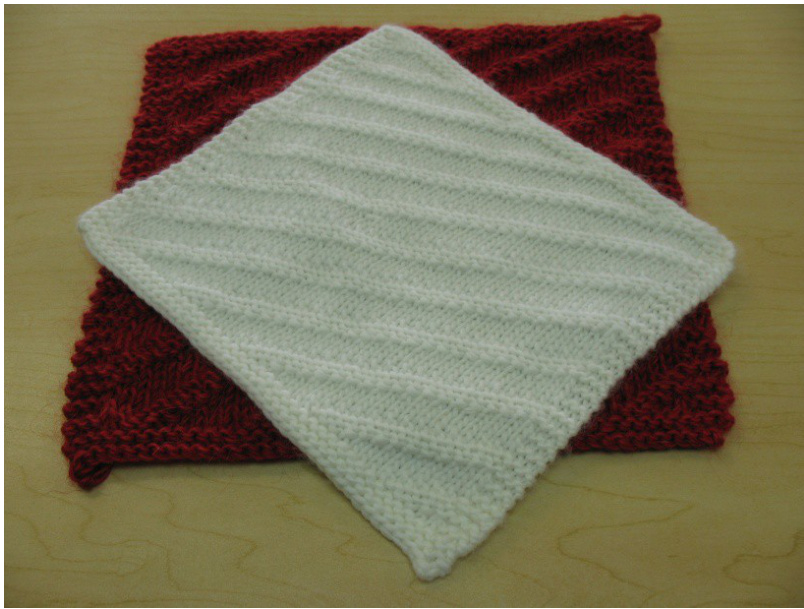2009: The Year of the Afghan - February
by Lorena Haldeman Overall, this afqhan was designed to be a learn-moreas-you-go project. While you could certainly make an afqhan out of the easiest first couple of months, my hope is that as I up the challenge level that you will rise to the occasion and take on some new skills. There has been much discussion on how to assemble your afqhan pieces when you are done. There are many schools of thoughts ranqing from attaching them as you go, to seaming them together when you are finished. Personally I went with crocheting a single chain around each square (this also gave me the opportunity to crochet more chains around the smaller squares and thus making all my squares the same size), after which they were crocheted toqether in strips, and those strips crocheted toqether to make n. I encourage you to experiment and find the best way that works for you!

Materials
75-100 yards of any worsted weight yarn US Size 7 needles (whatever gets you gauge, although gauge is reasonably flexible as long as all of your squares match each other; using larger needles and bigger yarn will get you a larger square, and using smaller needles and thinner yarn will get you a smaller one.)
Finished Size
11x11 inches, blocked.
Gauge
4-5 sts/inch on a US 7-8 Key
| Key |
| Knit (RS) Knit (WS) Purl |
| Purl 口 (RS) Purl (WS) Knit |
Copyright 09byLorenaHalema. fyou wish to donate tocharity auctions or even sellfnished objects fromthis patte to fnancially offset youhard work,have at itHwever, t patenitselfis free and Ihave not receivd any financial compenation for writin it so please do not make physical copie of this write patten and charge money for it. Thank, all. and happyMaking! Page 1
Directions
Cast on 44, using the Long Tail method (experienced knitters please feel free to substitute your favorite caston method. Knit three rows, and then follow the written instructions below, or the chart provided below the written instructions. Rows 3-11 on the chart should be worked a total of 7 times Row 1 (RS): k3, p3, k5, p3, k5, p3, k5, p3, k5, p3, k6 Row 2 (WS): k3, p4, k3, p5, k3, p5, k3, p5, k3, p5, k5 Row 3: k3, p1, k5, p3, k5, p3, k5, p3, k5, p3, k8 Row 4: k4, p5, k3, p5, k3, p5, k3, p5, k3, p5, k3 Row 5: k7, p3, k5, p3, k5, p3, k5, p3, k5, p2, k3 Row 6: k6, p5, k3, p5, k3, p5, k3, p5, k3, p3, k3 Row 7: k5, p3, k5, p3, k5, p3, k5, p3, k5, p3, k4 Row 8: k3, p2, k3, p5, k3, p5, k3, p5, k3, p5, k3, p1, k3 Repeat Rows 1-8 six more times, for a total of seven repeats.
| 44 | 43 | 42 41 | 4039 88 | 363534333231 | 29 | 282726252423 | 2221 | 20 | 19 | 1817 | 16 | 15 | 14 | 13 | 1211 | 10 | 6 | 8 | 7 | 6 | 5 | 4 | E | 2 | 1 | ||||||||||||||
| 一一一 | 一 | 一 | 一 一 | 一 | 一 | 一 | 一 | 一 | 一 | 一一一 | |||||||||||||||||||||||||||||
| 一一一 | 一一 | 一一二 | 一一一 | 一 | 一一 | ||||||||||||||||||||||||||||||||||
| 一一一一一二 | 二二二 | 一一二 | 二二二 | 一一一 | 二二二 | ||||||||||||||||||||||||||||||||||
| 一 | 一 | 一 | |||||||||||||||||||||||||||||||||||||
| 4 | 一 | 一 | 一一 | 一一 | 一一 | 一一 | |||||||||||||||||||||||||||||||||
| 一一一 | 一二一 | 一二二 | 一一 | 一一一 | 一一一 | ||||||||||||||||||||||||||||||||||
| 2 | 一一一 | 一一一 | 一一一 | 一一一 | |||||||||||||||||||||||||||||||||||
| 一一 | 一二一 | 1 | |||||||||||||||||||||||||||||||||||||
Knit three rows Bind off loosely Weave in ends; block.









